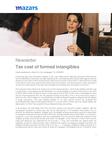
Tax cost of formed intangibles
A few days ago, the Colombian Institute of Tax Law (Icdt) and the Attorney General's Office sent to the Constitutional Court their concept regarding the unconstitutionality lawsuit filed against several articles of Law 1819 of 2016 (structural tax reform) by the author of this column. Although the concept of the Icdt is much more rigorous than that of the Procuraduría, from the tax point of view, because it comes from real experts in tax law, both concepts are valuable and have points in common.
The purpose of this article is to analyze one of the several points in which both entities coincide, and it is, precisely, in the request for the declaration of unenforceability of a part of Article 55 of Law 1819 of 2016, which limits the right to have a presumptive cost of 30% of the value of intangibles formed only for those taxpayers who are not required to keep accounting. This is one of the many cases in which the tax reform makes an unjustified discrimination between taxpayers obliged and not obliged to keep accounting. This was already studied in our last column, where we analyzed the unconstitutionality lawsuit filed against Article 77 of Law 1819 of 2016 that only allows taking tax depreciation on their fixed assets to those obliged to keep accounting.
In its analysis, the Icdt states that "The rule then, grants a tax benefit to certain subjects, with the consequent exclusion of others who will not be covered by it. The question that arises, then, is whether the distinction between 'obliged' and 'not obliged' to keep accounting records is reasonable for purposes of denying the tax benefit to the former and granting the same to the latter. In our opinion, except for a very few exceptions that are insubstantial, the only relevant difference between those 'obliged' to keep accounting records and those 'not obliged', is the moment in which their income, costs and expenses are understood to be accrued (...) Thus, the Colombian tax system does not establish, except for what has been said, a different tax regime for taxpayers obliged and those not obliged to keep accounting records. That is to say, (...), a taxpayer obliged to keep accounts is in principle governed by rules very similar to those of a taxpayer not obliged to do so. Therefore, there is no reasonable justification to infer the reasons why the benefit only applies to one class of taxpayers and not to another, even more so when both groups are taxed under taxable income (...)".
This conclusion is based on a long line of jurisprudence that the Constitutional Court has drawn over the years, according to which the basic premise of the right to equality is "to give equal treatment to people who are in the same condition and different treatment to people who are in situations with constitutionally relevant differences". In view of the fact that there is no such relevant difference, nor constitutionally valid, between those who are obliged and those who are not obliged to keep accounting records, it is clear that the challenged rule must be declared unconstitutional.
This position, coming from the highest body of tax studies in the country, constitutes an important precedent and a valuable line of thought to be followed in future unconstitutionality actions, since the reform brought multiple unjustified discriminations between taxpayers obliged and not obliged to keep accounting such as the rules to determine the tax cost of real estate, the method of valuation of inventories, the tax cost in the rendering of services, the gross income in the disposal of biological assets, the deductibility of the payment of social benefits, parafiscal contributions and taxes, the deduction of debts of doubtful or difficult to collect, among many others.


